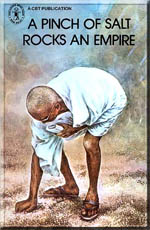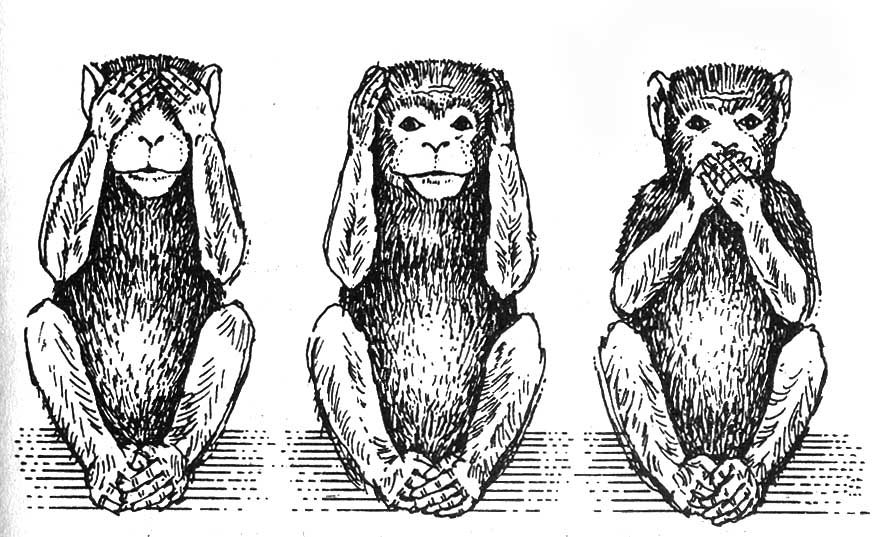
P.O. SEVAGRAM, DIST.WARDHA 442102, MS, INDIA. Phone: 91-7152-284753
FOUNDED BY MAHATMA GANDHI IN 1936
A Pinch of Salt Rocks An Empire
Children's Book : on Dandi March - Salt March

A PINCH OF SALT ROCKS AN EMPIRE
Compiled & Edited by : Sarojini Sinha
Table of Contents
- Map of March Route
- Chapter-1
- Chapter-2
- Chapter-3
- Chapter-4
- Chapter-5
- Chapter-6
- Chapter-7
- Chapter-8
- Chapter-9
- Chapter-10
- Chapter-11
- Chapter-12
- Chapter-13
About This Book
Compiled & Edited by : Sarojini Sinha
Illustration by : : Mrinal Mitra
First Published :1985
I.S.B.N :81-7011-291-5
Published by :Children's Book Trust
Printed at : Indraprastha Press
Nehru House,
4 Bahadur Shah Zafar Marg,
New Delhi,
India
Navajivan Mudranalaya,
Ahemadabad-380014
India.
© CBT, 1985
Download
Chapter - 6
The slow march to Dandi that took twenty-four days drew the attention not only of the people in India but all over the world.
It dominated newspapers and newsreels. When the government banned the showing of newsreels in several provinces in India, Gandhiji's secretary commented, "India's battle for freedom does not depend in the least on cinema films."
The entire nation's attention was focused on Gandhiji. Nehru said: "And today the pilgrim marches on his long trek. Staff in hand, he goes along the dusty roads of Gujarat, clear-eyed and firm of step, with his faithful band trudging along behind him. Many a journey has he undertaken in the past, many a weary road had he traversed. But longer than any that have gone before is this last journey of his and many are the obstacles in his way. The fire of a great resolve is in him and a surpassing love of his miserable countrymen. And love of truth that scorches and love of freedom that inspires.... It is a long journey, for the goal is the independence of India and the ending of the exploitation of her millions."
The All India Congress Committee met at Ahmedabad on March 21, nine days after the march to the sea had started. It approved of Mahatma Gandhi's campaign and hoped that the whole country would respond. It authorized Congress Committees in the provinces to organize the breaking of the salt law after Mahatma Gandhi had broken it at Dandi.
Pandit Nehru, who was then President of the Indian National Congress, met Gandhiji at Jambusar. With him was his father, Motilal Nehru.
They drafted a pledge that every volunteer who wanted to take part in the coming
satyagraha would have to take. It said:
- I desire to join the civil resistance campaign for the independence of India undertaken by the National Congress.
- I accept the creed of the National Congress, that is the attainment of Purna Swaraj by the people of India by all peaceful and legitimate means.
- I am ready and willing to go to jail and undergo all other sufferings and penalties that may be inflicted on me in the course of this campaign.
- In case I am sent to jail I shall not seek any monetary help for my family from Congress funds.
- I shall obey the order of those who are in charge of the campaign.
There was no doubt that thousands were ready to take the pledge. As the march continued, a wave of patriotic feeling swept the country. The national flag was being hoisted all over India and speeches were being made in defiance of the law.
Many people had been and were being arrested and sent to prison. But they had remained peaceful, as instructed by Gandhiji. He had said, "If you are sent to prison, you should go piously. If assaulted, you should bear it cheerfully, and, if shot, you should die peacefully."
Such was his hold on the people that they were ready to follow him unquestioningly. They were convinced of the justness of the cause, remembering the words: "The present government is corrupt and evil.... Loyalty to a State so corrupt is a sin, disloyalty a virtue.... The spectacle of three hundred million people being cowed down and living in dread of three hundred Englishmen is demoralizing alike for the despot as the victims.... It is the duty of those who have realized the evil nature of the system... to destroy it. It is their clear duty to run any risk to achieve this end."
Seeing the strong nationalistic feelings that had been aroused, the government gave signs of weakening. It promised to refer the question of the Salt Tax to the Tariff Board so as to provide salt to the masses at a low price. Gandhiji, however, refused to be satisfied with this.
The satyagrahis were now nearing the sea. Palm trees became more common, sea birds could be seen and they could feel the cooling sea breeze blowing in land. In the little town of Navsari, just twenty kilometers from Dandi, Gandhiji addressed a meeting and said, "I shall return with what I want or my dead body will float in the ocean".
On April 3, Gandhiji wrote in Young India an article giving the call for the mass civil disobedience campaign to begin on April 6, when he would break the salt law at Dandi. The date was chosen to coincide with the beginning of "National Week" in homage to the victims of the Jallianwala Bagh massacre of 1919.
On April 5, in the morning, the satyagrahis reached Dandi. Gandhiji retired to a bungalow on the beach which had been offered to him by its owner, a merchant, for his stay. He spent the day in prayer and meditation. Passages from the Vedas were read to him. From the bungalow he could see the rolling waves. On the sand lay great sheets of salt that had been left by the sea.
There were many journalists at Dandi to interview Gandhiji and he told the Associated Press:
"I cannot withhold my compliments from the government for the policy of complete non-interference adopted by them throughout the march... It remains to be seen if the government will tolerate, as they have tolerated the march, the actual breach of the salt law by countless people from tomorrow... God willing, I expect, with my companions, to commence actual civil disobedience at 6.30 tomorrow morning.
"The 6th of April has been to us, since the Jallianwala Bagh massacre, a day of penance and purification. We, therefore, commence it with prayers and fasting. I hope the whole of India will observe National Week commencing from tomorrow in the spirit in which it is conceived.
"I want world sympathy in this battle of right against might."
The satyagrahis who had come with Gandhiji strolled on the beach and many bathed in the sea. Police were posted in the compound of the bungalow where Gandhiji was staying, but everything was peaceful and they had no reason to worry.
